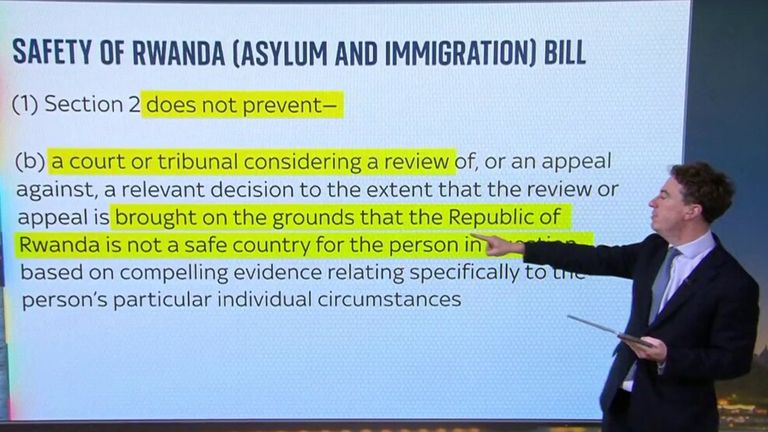Robert Jenrick has said the government’s Rwanda bill is too weak and will still mean a “merry-go-round” of legal challenges.
The former immigration minister quit this week over the new law – designed to speed up deportations and deter people from crossing the Channel on small boats.
Mr Jenrick, writing in The Daily Telegraph, said the idea it would “guarantee all those arriving are detained and swiftly removed is for the birds”.
He called for a law that “guarantees removal within days, not months, of arrival by blocking off individual challenges that would otherwise prevent that”.
The Newark MP said the bill – currently going through parliament – would still allow migrants to lodge individual appeals against deportation and “concoct a reason to delay their removal”.
Home Secretary James Cleverly travelled to Rwanda this week to sign a revised treaty after the original proposal was ruled unlawful by the Supreme Court.
The court said there was a “real risk” migrants sent there would be returned home and put in danger.
Prime Minister Rishi Sunak is currently battling to convince his MPs not to reject the bill when they vote on Tuesday.
He’s said the proposals mean successful claims by migrants trying to block their removal will be “vanishingly rare”, but Mr Jenrick said “small boat-chasing law firms” would take advantage.
“The ability for every illegal arrival to lodge a personal claim will place the courts under immense pressure,” Mr Jenrick said in The Telegraph.
“Backlogs will likely build, and cases that would at best take months to resolve will be stayed considerably longer.”
Mr Jenrick said the goal appeared to now be “delivering some symbolic, half-filled flights, taking off in the spring of next year” – and new government legal advice is said to be similarly pessimistic.
Read more:
Top civil servant summoned over costs of Rwanda plan
What is revamped plan and what hurdles does it face?
The Times reports the attorney general has been told the Rwanda bill has only a “50% at best” chance of getting fights off the ground next year.
That assessment – said to have been signed off by Sir James Eadie, who represented the government in the Supreme Court – is reportedly based on fears that the European Court of Human Rights would block the flights, as it did in June.
“We do not comment on or share government legal advice and it would be very wrong for anyone recently departing government to do so,” said a government official – who didn’t dispute the reported advice.
“Ministers are reassured that this bill goes as far as it can within international law and therefore ensures we can get flights off to Rwanda next year.”
Mr Jenrick and some in the Conservative Party want the UK to pull out of the European Convention on Human Rights, believing it will make it much easier to deport illegal migrants.
“Controlling our borders would, of course, be far more straightforward if we extricated ourselves from the complex web of international frameworks,” said Mr Jenrick in The Telegraph.
The new law will be voted on next Tuesday.
But with opposition parties already vowing to vote against it and fewer than 30 Tory rebels needed to kill the bill off, it could be a tough battle for the prime minister.
And Mr Jenrick closed his Telegraph piece by warning Mr Sunak he would face the “red-hot fury” of voters at the ballot box if he did not address their concerns about immigration.



